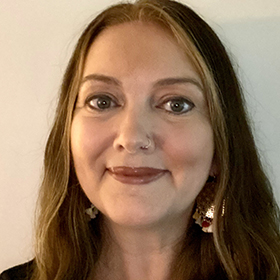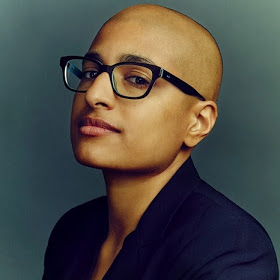The two full-time faculty members, who have strong professional and educational backgrounds, are familiar faces to Elon’s campus.
Rebecca Bagley and Sowjanya Kudva, who both joined the School of Communications as full-time faculty members this fall, arrive with a breadth of experience. Yet, arrive might not be the best description since they are familiar faces to many communications majors, having previously taught on campus as adjunct instructors.
Please welcome and get to know Bagley and Kudva a little better.
Rebecca Bagley
Assistant Professor of Communication Design
An experienced designer, educator and artist, Bagley came to Elon in spring 2019 fully aware of the campus’ academic standing.

“I always knew that Elon had a great reputation, and when I was looking at professor positions, and I was looking at the curriculum, the school and the university were really appealing to me,” she said.
Bagley, who earned her M.F.A. in graphic design from the Tyler School of Art at Temple University, is certainly familiar with higher education classrooms. Previously, she’s taught at The Art Institute of Raleigh-Durham, Temple University and the Moore College of Art & Design in Philadelphia. Additionally, Bagley has ample work experience in the design field, with roles at small boutique studios as well as large organizations with in-house design teams, including Barclays and FS Investments.
“Thanks to those past experiences, I feel like I can talk to the students about what they can expect once they leave Elon,” she said.
Part of Elon’s allure for Bagley was joining a relatively young communication design program; Elon’s program began in 2014. The assistant professor views it as an opportunity to make an impact as the major matures and expands.
“I have helped grow other programs before and that has always interested me,” Bagley said. “When I was considering Elon, and started looking the department’s other professors, I liked what they were doing. The curriculum, the program, the faculty – it all stood out to me.”
Many communication design majors have already become acquainted with Bagley, who served as an adjunct professor for three semesters before getting hired full time. During the past two years, she said she’s found her students to be “very thoughtful and thankful.”
“You really get a sense that they are engaged and want to learn,” added Bagley, who is teaching Visual Communication, and Web and Mobile Publishing this semester. “They are willing to reach out when there are issues, which I appreciate. And I’ve been impressed by their level of work. They are willing to push themselves.”
Bagley said she enjoys the opportunity to teach the communication design major’s capstone course, Design Strategies and Solutions. Paired with her own experiences, as well as teaching similar classes and serving on portfolio review boards, Bagley explained that she has a lot to offer soon-to-be graduates.
“I believe I have a good grasp on what should be in their portfolios, and it has been fun to work with students as they wrap up their time here and prepare a package to land a job – a good job,” she said.
Additionally, her syllabus and assignments are focused on recreating circumstances that mimic real-world projects.
“When I give students assignments, I try to give them a real-world scenario,” she said. “For each assignment, I explain how it would work in the real world. This is how you would pitch it. Because it is important for them to know what to expect.”
Before graduating from Temple’s Tyler School of Art, Bagley earned a bachelor’s degree at North Carolina Central University.
For a closer look at her past work, visit Bagley’s personal design portfolio at www.thedesignapothecary.org.
Sowjanya Kudva
Assistant Professor of Cinema and Television Arts
The assistant professor of cinema and television arts describes Elon’s School of Communications and its approach to education as an ideal fit.

“First and foremost, as a person who loves to teach, I am thrilled to be a part of, and contribute to, Elon’s student-centered ethos,” Kudva said. “As a filmmaker and scholar who thinks broadly about the cultural impact of multimedia narratives, I love that my department is housed within the School of Communications – where I can bring more expansive interpretations of cinema and television arts to my curriculum.”
Kudva arrived in spring 2020 as an adjunct instructor with nearly two decades of experience in video production. The accomplished filmmaker has written, produced, directed, shot and edited for an array of clients – from corporates and nonprofits – and passion projects. The past spring semester allowed Kudva time to get acclimated to the school, students, fellow faculty members and, importantly, Moodle.
“So far, my experience with Elon students has been amazing,” the assistant professor said. “It’s always a joy to teach students who are as engaged, genuine and curious as they are.”
The professor’s teaching method incorporates past professional and academic experiences, while integrating practical and ethical considerations of instruction and curriculum design.
“In the classroom, I promote a solutions-oriented mindset, helping students develop the skills to successfully negotiate the challenges of making media,” Kudva said. “Ethically, I believe that filmmaking is about collaboration and building trust in relationships. Therefore, I encourage safe and open inquiry in the classroom by involving my students in the process and holding us all accountable for creating a safe space together.”
The professor explained that students flourish in a classroom culture that allows for growth through mistakes, and that a non-judgmental environment makes room for a spectrum of ideas and the vulnerability required for creativity.
“I also believe my ethical responsibility is to prepare a diverse curriculum that expands upon mainstream forms of media, fosters critical analysis, and helps students broaden their perspective and find their own unique voice,” Kudva said.
This fall, Kudva is helping students find their creative voices in courses titled Entertainment Media, and Writing for TV and Cinema.
Kudva, who earned a M.F.A. in film and media arts at Temple University, initially developed an interest in teaching while serving as a creative mentor with BAYCAT, a San-Francisco based nonprofit that educates and employs low-income youth in media making. That experience is one the professor holds near and dear.
“BAYCAT introduced me to teaching and mentorship, and how fun and fulfilling it could be,” Kudva said. “My experiences at BAYCAT – like helping the students make a music video on the sloping streets of Potrero Hill – was a major reason I chose to apply to grad school and become an educator.”
Prior to attending graduate school at Temple University, Kudva earned a B.F.A. from the University of North Carolina School of the Arts, School of Filmmaking.
To view Kudva’s portfolio, visit www.sowjfilms.com.


